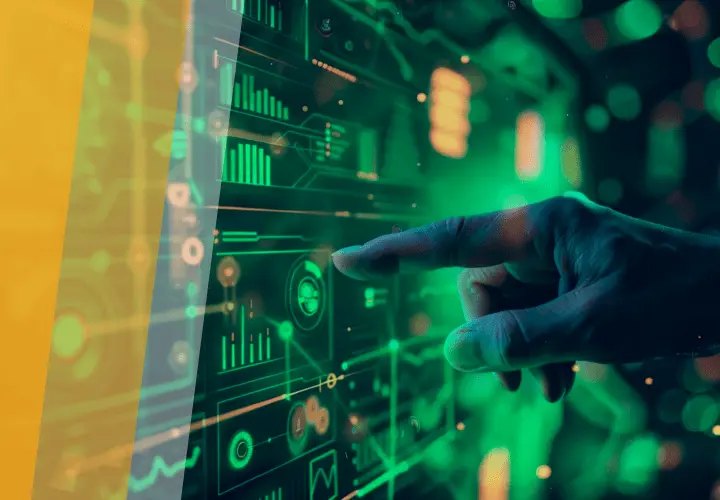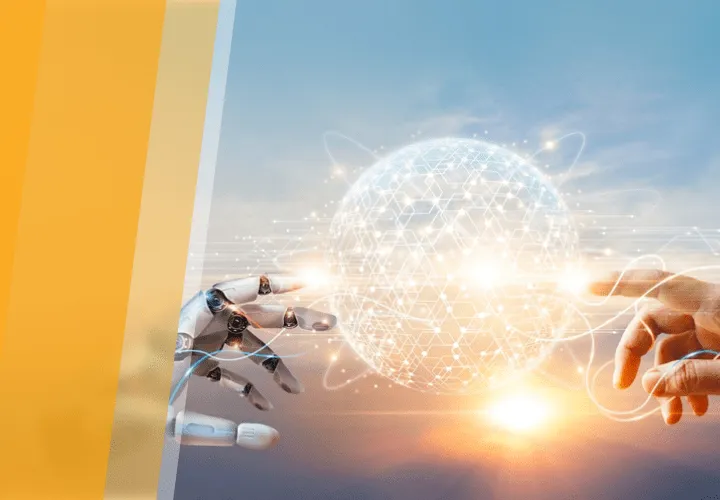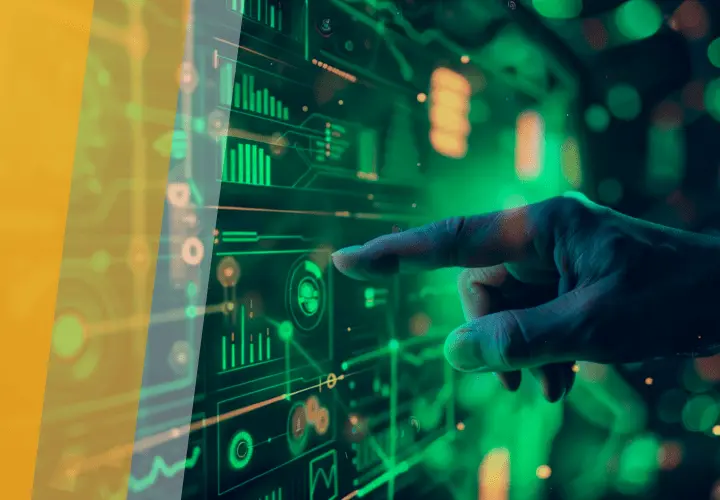Strategic Technology Trends for 2026
Table of contents
- The Evolving Digital Landscape: A New Normal
- Economic Drivers of Technology Investments
- Strategic Technology Trends Shaping 2025-2030
- AI at the Core: From Generative to Agentic Intelligence
- Generative AI: Enhanced Capabilities and Industry Impact
- Agentic AI: Autonomous Systems and the Rise of Virtual Workforces
- AI Governance, Ethics, and Misinformation Security
- Advanced Computing and Infrastructure
- Quantum Computing
- Leading Countries in Quantum Computing
- Edge Computing and Deployable AI
- How Edge Computing Is Being Applied
- Distributed Infrastructure
- Intelligent Automation and Robotics
- Hyperautomation
- Human-Technology Convergence
- Total Experience (TX)
- Neurological Augmentation
- Privacy-Enhancing Computation (PEC) for Trust and Security
- Building a Future-Ready Organization
- Addressing Scaling Challenges and Infrastructure Demands
- Navigating Regulatory Complexity and Advanced Cybersecurity Risks
- FAQs
- 1. Why is "Energy Sovereignty" becoming a top technology trend for 2026?
- 2. How do we distinguish between "Hype" and "Value" in Quantum Computing for 2026?
- 3. What is the "Martek’s Law" penalty, and how do we avoid it?
- 4. How does "Distributed Infrastructure" impact our 2026 Cybersecurity budget?
- 5. Will "Neurological Augmentation" be mandatory for knowledge workers by 2030?
- 6. What is the specific ROI of "Agentic AI" compared to "Generative AI"?
- Conclusion
The period from 2025 to 2030 is set to be shaped by an unprecedented convergence of artificial intelligence, advanced computing, and intelligent automation. This isn't just a minor evolution; it's a fundamental reshaping of how businesses operate, interact with customers, and create products.
For companies aiming for sustainable growth, it’s no longer enough to simply react to what’s new. You need to proactively adapt your strategy and deeply understand these evolving tech trends. The focus is shifting from just using new tools to strategically integrating them to build "living intelligence"—smart systems that can perceive, learn, and grow on their own.
This report synthesizes findings from leading research organizations to provide a comprehensive overview of the key technology trends from 2025 to 2030. It offers actionable insights for businesses that want to lead the economy of the future.
The Evolving Digital Landscape: A New Normal
Technology markets are growing ten times faster than their traditional counterparts, yet many businesses struggle to keep up. This gap is known as Martek's Law: technology evolves exponentially, while organizations change much slower. To survive, companies must now prioritize flexible architectures and agile methods as a continuous mode of operation, not just for crisis response. This also requires a cultural shift and continuous upskilling to match the pace of technological development.
Economic Drivers of Technology Investments
Despite persistent inflation, U.S. technology spending is projected to reach $2.7 trillion in 2026. This growth is driven by two main factors:
- Rising cybersecurity risks. The more we use AI and cloud computing, the more opportunities there are for cyberattacks.
- The revolution fueled by AI and cloud technologies. Businesses are investing in these powerful tools to drive future growth and innovation.
These two drivers are connected. The adoption of new technologies creates new security challenges, which, in turn, fuels more investment in cybersecurity. A holistic approach that builds security into AI and cloud systems from the start is crucial for innovation and maintaining trust.
Strategic Technology Trends Shaping 2025-2030
AI at the Core: From Generative to Agentic Intelligence
Artificial intelligence continues to be the most powerful force in the industry, amplifying virtually all other tech trends.
To better understand the basics of this foundational technology, see our article AI 101: Understanding the Basics of AI, ML, Data Science, and Generative AI.
Generative AI: Enhanced Capabilities and Industry Impact
Generative AI (GenAI) is a technology that creates new content: text, audio, images, and code. Gartner predicts that by 2026, GenAI will be responsible for 10% of all data created. It automates tasks in software development, education, and customer service, and is also used in targeted marketing.
Despite its capabilities, GenAI is known for "hallucinations"—that is, it invents false information, which can be critically dangerous for important applications. Recent studies have shown that AI tools can even slow down experienced developers by 19%, which contradicts common expectations.
Companies should implement AI with realistic expectations, integrating it into workflows rather than simply adding new tools. To gain real benefits, employees need to be trained. GenAI creates huge amounts of data, but some of it may be inaccurate. Therefore, businesses must invest not only in content creation tools but also in AI governance platforms to verify information and maintain trust.
Agentic AI: Autonomous Systems and the Rise of Virtual Workforces
Agentic AI represents a significant step forward from generative models. Unlike GenAI, which simply responds to prompts, agentic AI can make decisions and take actions independently to achieve goals. It shifts AI from "talk" to "action." To explore the key differences between these two powerful technologies, read our deep dive: Assistive AI vs. Agentic AI. According to Gartner, by 2028, at least 15% of daily business decisions will be made autonomously by AI agents.
Agentic AI boosts productivity by managing complex projects, automating customer interactions, and accelerating decision-making. It helps create "self-healing" supply chains and enables personalized patient care in healthcare. This trend includes both physical robots and digital agents that learn, adapt, and collaborate.
Implementing agentic AI requires strong safety measures and human oversight. It’s recommended to start with small pilot projects. The rise of agentic AI will redefine job roles, shifting the human focus from task execution to oversight and complex problem-solving. Companies need to invest in reskilling employees, focusing on skills in AI ethics, data science, and human-AI collaboration.
AI Governance, Ethics, and Misinformation Security
As AI becomes more common and autonomous, ensuring its responsible, ethical, and secure use is essential. AI governance platforms are being developed to manage risks like data privacy and bias. These platforms help companies ensure their AI models meet security and ethical standards, and they are expected to be a major market, projected to reach $50 billion by 2030. Companies using these tools could see significantly higher customer trust and regulatory compliance scores.
With AI's ability to create convincing but false content, safeguards are crucial to combat misinformation. These include tools for detecting AI-generated content and authenticating information. Gartner predicts that by 2028, 50% of companies will use security services to protect against misinformation. Key challenges still include ethical concerns, economic inequality in accessing AI, and the complexity of global regulations like the EU AI Act.
While these governance measures may seem like a reaction to new technology, being proactive about them can become a competitive advantage. Companies that build strong governance into their AI from the start will strengthen their brand reputation, avoid costly legal issues, and attract top talent. This focus on trust is becoming a key differentiator in the market.
Advanced Computing and Infrastructure
The fundamental computing infrastructure is undergoing a radical transformation, driven by the need for unprecedented processing power, real-time insights, and resilient, distributed operations. These are critical tech trends shaping our digital future.
Quantum Computing
The quantum computing market, projected to reach $2.19 billion in 2026, is expected to grow to $7.08 billion by 2030. This expansion is fueled by robust government and private sector investments that accelerate the research and development of quantum technologies.
Leading Countries in Quantum Computing
- China leads in government investment, having put over $15 billion into quantum technologies. The country is actively developing quantum communications and computing, with its Jiuzhang quantum computer serving as a prime example.
- The U.S. leads in private investment and startups, as well as the quality of scientific publications. Major tech companies like IBM and Google play a key role here.
- Europe, particularly Germany and France, is also heavily investing in quantum technologies to compete with the U.S. and China. The "Quantum Flagship" initiative unites research, startups, and collaborations across the continent.
- Canada and the UK are also major players, making significant investments in developing talent and infrastructure for quantum technologies.
Quantum computing promises to solve complex problems much faster than conventional computers, especially in drug discovery, financial modeling, and logistics.
However, as quantum computers advance, they pose a serious threat to modern cybersecurity, as they could render most encryption methods obsolete. This creates an urgent need to transition to post-quantum cryptography to protect data from future attacks. Companies that handle sensitive information must proactively implement quantum-resistant solutions to ensure the long-term security of their data.
Edge Computing and Deployable AI
There's a significant shift from cloud-centric AI to edge intelligence. This move is driven by the need for real-time speed, better privacy, and less reliance on constant internet connections. By 2030, over 50 billion edge devices — like smartphones, smart glasses, and industrial IoT systems — will process data instantly where it's created. This eliminates cloud latency, boosts reliability, and keeps data private by processing it on the device itself.
While the benefits are huge, there are technical challenges. These include managing resource-intensive AI models on smaller devices and ensuring consistent security across a wide-scale network.
Table 1: Generative AI Model Taxonomy and Edge Deployability
| Model Size Category | Parameter Range | Typical Size | Suitability/Characteristics | Deployability (Microcontrollers) | Deployability (Mobile Devices) | Deployability (Enterprise Servers) | Deployability (Cloud Servers) |
| Small Models | < ~1 Billion | ~100MB - 2GB | Efficiency priority | Ideal | Ideal | Ideal | Ideal |
| Medium Models | 1–10 Billion | ~2GB - 20GB | Balance performance and efficiency | Difficult | Difficult | Ideal | Ideal |
| Large Models | 10–100 Billion | ~20GB - 200GB | Flagship LLMs | Impossible | Impossible | Difficult | Ideal |
| Ultra-Large Models | 100 Billion+ | > ~200GB | Pushing hardware limits | Impossible | Impossible | Impossible | Ideal |
How Edge Computing Is Being Applied
Edge computing is enabling transformative applications across various sectors:
- Healthcare: It powers real-time patient monitoring and diagnostics, like glucose-reading devices that provide immediate dietary recommendations.
- Wearables and AR: AR glasses can provide contextual information instantly, and smartwatches can deliver timely health alerts without delay.
- Robotics: For self-driving cars, drones, and industrial robots, edge computing enables on-site autonomy and instantaneous decision-making, which is critical for safety and efficiency.
- Industrial IoT: It's used for real-time anomaly detection in machinery and for creating machine log summaries, optimizing maintenance and operations.
Edge computing directly addresses the limitations of cloud AI, such as latency and privacy concerns. For truly autonomous systems, instantaneous on-device decision-making is essential. Businesses developing products that require local processing or high data privacy must prioritize edge AI strategies. This approach will unlock a new generation of intelligent, ubiquitous systems that go beyond simple cloud connectivity.
Distributed Infrastructure
Organizations with multiple locations, remote workers, or branch offices are increasingly adopting a distributed enterprise model, which is essential for hybrid work. Gartner projects that by 2026, 75% of enterprises implementing this strategy will have outpaced their competitors’ growth by 25%. This trend builds on a strong foundation: by 2022, 70% of companies had already transitioned to hybrid or multi-cloud platforms.
This distributed IT approach enhances speed, agility, and cybersecurity by allowing for faster data processing closer to where it's needed. However, this model creates a challenge: data is scattered across many locations and systems.
To manage this fragmented data, a data fabric is essential. It's a flexible, integrated architecture that connects data across platforms and makes it easily accessible to different users. This approach uses continuous analytics to ensure data is consistent and reusable, regardless of its physical location.
Without a data fabric, the benefits of distributed operations would be lost to data silos and inconsistencies. Businesses must therefore see the data fabric not as an optional add-on, but as a fundamental part of their IT strategy. It's the key to enabling seamless operations and informed decision-making across geographically dispersed teams and systems.
Intelligent Automation and Robotics
The drive for efficiency, productivity, and sustainability is pushing unprecedented levels of automation, extending beyond simple task repetition to complex, adaptive processes and physical interactions. This is one of the most visible tech trends today.
Hyperautomation
Hyperautomation is the process of automating every possible task by combining various tools and technologies. It boosts productivity by handling repetitive, complex, and time-consuming tasks in everything from back-office operations to core industrial functions. For example, it can automate documentation, freeing employees from tedious work. McKinsey predicts that around half of all existing activities could be automated in the coming decades.
While hyperautomation displaces some jobs by automating repetitive tasks, it also creates new, higher-value roles that require different skill sets. As AI is projected to create 97 million new jobs by 2027 while displacing 85 million, this shift makes large-scale reskilling and upskilling programs essential. Companies must strategically plan for this workforce transformation by investing in training and redesigning job roles to help their employees collaborate effectively with automated systems.
Polyfunctional Robots
Next-generation polyfunctional robots are designed to perform various tasks and fit into human environments without needing major architectural changes. This allows for faster deployment and easy scalability. Gartner estimates that by 2030, 80% of humans will interact with smart robots daily, a huge jump from less than 10% in 2024. These robots can quickly switch between tasks in factories, warehouses, and even consumer settings, thanks to advanced software and hardware.
Humanoid robots, for example, are set to transform patient care and medical research, from handling hazardous waste to assisting in operating rooms.
However, implementing these robots is complex. It requires extensive safety measures, advanced AI-driven autonomy, new workspace layouts for human-robot coexistence, and staff training. The success of these robots depends not only on the technology itself but also on a holistic approach to their integration, focusing on safety protocols and ethical considerations for seamless and safe coexistence with humans.
Human-Technology Convergence
The boundary between humans and technology is blurring, leading to new interaction models, augmented human capabilities, and a holistic approach to experience design. These tech trends are redefining our daily lives.
Total Experience (TX)
Total Experience (TX) is a strategy that links four key areas: Customer Experience (CX), Employee Experience (EX), User Experience (UX), and Multi-Experience (MX). The main goal is to boost trust, satisfaction, and loyalty for everyone involved—customers, employees, and users. According to Gartner, organizations that excel at this will drive increased sales and profits.
As businesses become more distributed with remote and hybrid work, interactions are often fragmented across many different digital and physical channels. A TX strategy is crucial to ensure a consistent and positive experience across all these points. Without it, fragmented experiences can lead to employee disengagement and customer churn. TX isn't just a marketing or HR trend; it's a fundamental business strategy for the modern enterprise. By thoughtfully designing this integrated experience, companies can strengthen their brand and drive sustainable growth.
Neurological Augmentation
Neurological augmentation involves technologies that read and decode brain activity to enhance human cognitive abilities. These are known as brain-computer interfaces (BCIs). Gartner predicts that by 2030, 30% of knowledge workers will rely on BCIs to stay relevant in an AI-driven workplace. Non-invasive wearables are already in niche use for things like gaming and mindfulness, while more advanced versions are in human trials.
This trend marks a new phase of human-machine collaboration, shifting the focus from replacing humans to augmenting them. However, widespread adoption faces significant ethical, regulatory, and privacy challenges. These technologies directly interface with human biology and cognition, raising profound questions about self-identity, autonomy, and data ownership.
Businesses entering this field must prioritize ethical design, transparency, and robust privacy safeguards. Proactive engagement with policymakers and ethicists will be crucial to building public trust and ensuring responsible development in this transformative area.
Privacy-Enhancing Computation (PEC) for Trust and Security
Privacy-enhancing computation (PEC) protects sensitive information during data processing and analysis. Gartner projects that by 2026, 60% of large companies will have adopted PEC techniques for processing data in untrusted environments. This is critical for industries like healthcare, where securing patient data in EMR/EHR systems and remote monitoring systems is a top priority.
Many powerful AI applications, such as personalized medicine and financial analytics, rely on vast amounts of sensitive data. Without strong privacy protection, these innovations would face major regulatory hurdles and public distrust. PEC allows companies to extract value from this data in a secure, compliant way without compromising privacy.
Ultimately, PEC is more than just a compliance tool; it's a strategic driver of competitive advantage. Companies that master PEC can unlock new data-driven opportunities, strengthen customer trust, and navigate complex regulations more effectively, especially in highly regulated sectors where data privacy is paramount.
Building a Future-Ready Organization
True competitive advantage in the 2025-2030 landscape extends beyond mere technology adoption. These tech trends demand a holistic approach.
Addressing Scaling Challenges and Infrastructure Demands
The escalating demand for resource-intensive workloads like GenAI, robotics, and immersive environments is creating new requirements for global infrastructure. While the focus is often on software and algorithms, the underlying physical infrastructure—power grids, data centers, and network cabling—is becoming a critical bottleneck. The exponential growth in demand for computing power from AI is straining existing infrastructure, which can slow down deployment and innovation.
Companies cannot focus solely on digital transformation; they must also account for these physical limitations. A successful strategy requires a "full-stack" approach, from silicon to software. This includes:
- Strategic partnerships with energy providers.
- Investments in sustainable infrastructure.
- Advocacy for favorable regulatory policies.
These efforts are crucial to enable scalable and sustainable technology adoption for the future.
Navigating Regulatory Complexity and Advanced Cybersecurity Risks
Governments will increasingly implement AI governance frameworks to manage risks, ensure transparency, and address ethical concerns. Harmonizing AI regulations across different regions will be a complex, ongoing challenge.
The threat from sophisticated AI-driven cyberattacks is growing rapidly, with a projected annual cost to businesses of $10 trillion by 2030. This is made even more dangerous by the looming threat of quantum computers, which could render current encryption methods obsolete. This urgent need for new cryptographic methods is driving the race to develop post-quantum cryptography.
Cybersecurity can no longer be an afterthought. It must be integrated into every stage of AI development and deployment. Companies need to invest in advanced threat analytics, AI-powered security solutions, and long-term quantum-safe strategies to protect against increasingly intelligent cyber adversaries. This also highlights the ethical responsibility of AI developers to build secure and resilient systems from the very beginning.
The future of work is not human vs. AI, but human with AI. While AI will create new jobs, it will also displace existing ones. Roles in data science and information security will expand rapidly, while repetitive jobs in areas like data entry and customer service may decline due to automation. This is a fundamental redefinition of human work.
By 2030, 50% of the global workforce will require retraining due to AI integration. This demands a proactive approach to talent development. Tasks that are repetitive will be handled by AI, pushing humans toward roles that require unique skills like creativity, critical thinking, emotional intelligence, and complex problem-solving in collaboration with AI.
Organizations must actively invest in continuous learning programs that foster human-AI co-understanding. This includes:
- Designing new workflows that optimize human-AI teams.
- Developing ethical guidelines for collaborative intelligence.
- Cultivating a culture that embraces AI as a partner in innovation, not just a tool for automation.
Table 2: Economic and Social Impact of AI and Emerging Technologies by 2030
|
Area of Impact |
Key Forecast/Metric (by 2030) | Source |
|
AI Contribution to Global GDP |
$15.7 trillion ($6.6 trillion from productivity gains, $9.1 trillion from consumption effects) | PwC, 2023 |
|
U.S. Healthcare Savings (AI) |
$150 billion annually (diagnostics, personalized medicine, operational efficiency) | McKinsey, 2024 |
|
Value Added in Manufacturing (Smart Factories) |
$1.5–2.2 trillion annually (increased efficiency, predictive maintenance, quality control) | BCG, 2024 |
|
Banking Sector Savings (AI) |
Over $447 billion (fraud detection, process automation, improved customer experience) | ScienceDirect |
|
Job Creation/Displacement (AI) |
97 million new jobs created, 85 million displaced (by 2027) | World Economic Forum, 2023 |
|
Workforce Reskilling Need |
50% of global workforce (by 2030) | WEF, 2024 |
|
AI Governance Market |
$50 billion | Gartner, 2024 |
|
Carbon Emission Reduction (AI) |
Up to 10% (energy optimization, precision agriculture, supply chain efficiency) | Farmonaut, 2025 |
|
Cost of AI-Driven Cyberattacks |
$10 trillion annually | Cybersecurity Ventures, 2025 |
True advantage in 2025–2030 hinges not just on technology, but on an organization's strategic adaptability. Simply adopting AI isn't enough; real-world constraints like power shortages, talent gaps, vulnerable infrastructure, and complex regulations demand a holistic approach where IT, HR, and operations synchronize. Cybersecurity must be proactive, built-in from the start—from code to culture—to counter escalating AI threats and the quantum computing era. For people, it's about redefining roles, not replacement. The strongest companies will partner with AI, not just use it as a tool, investing in skills, flexibility, and human-machine collaboration. The future belongs to those who can evolve with technology. - Eric Johnson, Marketing Expert, Emerline
FAQs
1. Why is "Energy Sovereignty" becoming a top technology trend for 2026?
The exponential growth of Agentic AI and Quantum Computing has created a massive power deficit. By 2026, the primary bottleneck for tech scaling isn't software; it's the electrical grid. Forward-thinking enterprises are now integrating energy strategy into their IT roadmap, investing in small modular reactors (SMRs) or direct-to-chip liquid cooling to ensure their AI models don't face "brownout" throttling.
2. How do we distinguish between "Hype" and "Value" in Quantum Computing for 2026?
In 2026, we have entered the NISQ (Noisy Intermediate-Scale Quantum) era. While we aren't cracking all global encryption yet, value is found in Quantum-Classical Hybrids. If your business involves complex optimization (like logistics or drug discovery), 2026 is the year to begin "Quantum Proofing" your data. Waiting until 2030 will leave your encrypted archives vulnerable to "Harvest Now, Decrypt Later" attacks.
3. What is the "Martek’s Law" penalty, and how do we avoid it?
Martek’s Law states that technology changes exponentially, but organizations change logarithmically. The "penalty" is the widening gap between what your tools can do and what your employees actually utilize. To close this gap in 2026, companies must pivot from "Training Sessions" to Continuous Upskilling Loops, where AI agents act as real-time coaches for employees during their daily workflows.
4. How does "Distributed Infrastructure" impact our 2026 Cybersecurity budget?
The shift to a distributed enterprise model (75% of enterprises by 2026) effectively dissolves the "secure perimeter." Your budget must shift from Firewalls to Zero Trust Data Fabrics. In 2026, security is no longer about guarding the building; it’s about guarding the data itself through Privacy-Enhancing Computation (PEC), ensuring information remains encrypted even while it is being analyzed.
5. Will "Neurological Augmentation" be mandatory for knowledge workers by 2030?
Mandatory? No. Competitive? Likely. By 2026, Non-Invasive Brain-Computer Interfaces (BCIs) - like high-fidelity EEG headbands - are moving from gaming into the enterprise for focus-tracking and cognitive load management. The trend for 2026 is "Bio-Digital Integration," where technology helps humans keep pace with AI-driven data flows without burning out.
6. What is the specific ROI of "Agentic AI" compared to "Generative AI"?
Generative AI saves time on Content (writing an email); Agentic AI saves time on Workflows (processing a refund, re-routing a ship, or managing a calendar). In 2026, the ROI of Agentic AI is measured in Autonomous Task Completion Rates. Organizations using AI agents are seeing a 40% reduction in operational friction because the AI is "doing" the work rather than just "suggesting" how to do it.
Conclusion
The period from 2025 to 2030 presents a monumental opportunity for growth and innovation. Success hinges on a proactive approach, strategic foresight, and the ability to adapt faster than ever. If you are looking for ways to stand out with innovative technological solutions, we are ready to help. Contact us for a free consultation.
Updated on Jan 23, 2026





